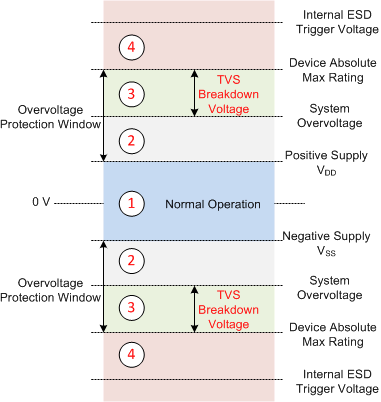ZHCSNI0B March 2021 – November 2022 TMUX7411F , TMUX7412F , TMUX7413F
PRODMIX
- 1 特性
- 2 应用
- 3 说明
- 4 Revision History
- 5 Device Comparison Table
- 6 Pin Configuration and Functions
-
7 Specifications
- 7.1 Absolute Maximum Ratings
- 7.2 ESD Ratings
- 7.3 Thermal Information
- 7.4 Recommended Operating Conditions
- 7.5 Electrical Characteristics: Global
- 7.6 ±15 V Dual Supply: Electrical Characteristics
- 7.7 ±20 V Dual Supply: Electrical Characteristics
- 7.8 12 V Single Supply: Electrical Characteristics
- 7.9 36 V Single Supply: Electrical Characteristics
- 7.10 Typical Characteristics
-
8 Parameter Measurement Information
- 8.1 On-Resistance
- 8.2 Turn-On and Turn-Off Time
- 8.3 Off-Leakage Current
- 8.4 On-Leakage Current
- 8.5 Input and Output Leakage Current Under Overvoltage Fault
- 8.6 Fault Response Time
- 8.7 Fault Recovery Time
- 8.8 Fault Flag Response Time
- 8.9 Fault Flag Recovery Time
- 8.10 Charge Injection
- 8.11 Off Isolation
- 8.12 Inter-Channel Crosstalk
- 8.13 Bandwidth
- 8.14 THD + Noise
- 9 Detailed Description
- 10Application and Implementation
- 11Power Supply Recommendations
- 12Layout
- 13Device and Documentation Support
- 14Mechanical, Packaging, and Orderable Information
9.3.2.7 EMC Protection
The TMUX7411F, TMUX7412F, and TMUX7413F are not intended for standalone electromagnetic compatibility (EMC) protection in industrial applications. There are three common high voltage transient specifications that govern industrial high voltage transient specification: IEC61000-4-2 (ESD), IEC61000-4-4 (EFT), and IEC61000-4-5 (surge immunity). A transient voltage suppressor (TVS), along with some low-value series current limiting resistor, are required to prevent source input voltages from going above the rated ±60 V limits.
When selecting a TVS protection device, it is critical to ensure that the maximum working voltage is greater than both the normal operating range of the input source pins to be protected and any known system common-mode overvoltage that may be present due to miswiring, loss of power, or short circuit. Figure 9-1 shows an example of the proper design window when selecting a TVS device.
Region 1 denotes normal operation region of TMUX7411F, TMUX7412F, and TMUX7413F, where the input source voltages stay below the supplies VDD and VSS. Region 2 represents the range of possible persistent DC (or long duration AC overvoltage fault) presented on the source input pins. Region 3 represents the margin between any known DC overvoltage level and the absolute maximum rating of the TMUX741xF. The TVS breakdown voltage must be selected to be less than the absolute maximum rating of the TMUX7411F, TMUX7412F, and TMUX7413F, but greater than any known possible persistent DC or long duration AC overvoltage fault to avoid triggering the TVS inadvertently. Region 4 represents the margin system designers must impose when selecting the TVS protection device to prevent accidental triggering of ESD cells of the TMUX7411F, TMUX7412F, and TMUX7413F devices.
 Figure 9-1 System Operation Regions and Proper Region of Selecting a TVS Protection Device
Figure 9-1 System Operation Regions and Proper Region of Selecting a TVS Protection Device